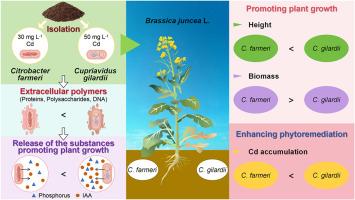当前位置:
X-MOL 学术
›
Environ. Pollut.
›
论文详情
Our official English website, www.x-mol.net, welcomes your
feedback! (Note: you will need to create a separate account there.)
Two strains of cadmium (Cd)-resistant bacteria isolated from soils and their ability to promote oilseed rape (Brassica juncea L.) to grow and absorb Cd in soils
Environmental Pollution ( IF 7.6 ) Pub Date : 2024-12-16 , DOI: 10.1016/j.envpol.2024.125549 Fang Wang, Xia Jia, Yonghua Zhao, Xuelian Yang, Xiaojuan Feng
Environmental Pollution ( IF 7.6 ) Pub Date : 2024-12-16 , DOI: 10.1016/j.envpol.2024.125549 Fang Wang, Xia Jia, Yonghua Zhao, Xuelian Yang, Xiaojuan Feng

|
As a highly toxic, mobile, and persistent heavy metal, cadmium (Cd) in soils is becoming a crucial environmental problem. Most of classical physical and chemical remediation measures for Cd-contaminated soils possibly cause some dangers to soil structure and characteristics and potential secondary pollution, however, Cd-resistant microbial which can sequestrate Cd by releasing extracellular polymeric substances (EPS) capable of ion exchange, coordination, and adsorption and improve plant growth should be favorable for remediation of Cd-contaminated soils due to being environmentally friendly and cost-effective. Therefore, the plant-microbe combination is becoming a priority option in the remediation of Cd-contaminated soils. Here, we isolated two strains of Cd-resistant bacteria from soils and investigated the ability of the two strains to promote growth of oilseed rape (Brassica juncea L.) and Cd uptake by the plants. Citrobacter farmeri and Cupriavidus gilardii were isolated from soils via culture media containing 30 and 50 mg/L Cd, respectively, which could release EPS including proteins, polysaccharide, and DNA. The EPS from C. gilardii was significantly higher than that from C. farmeri, and the proportion of protein in EPS was the highest for two strains. Additionally, two strains secreted indole-3-acetic acid (IAA) and could solubilize phosphorus, and the ability of C. gilardii to secret IAA was significantly higher than that of C. farmeri. The pot experiment indicated that C. farmeri and C. gilardii significantly enhanced oilseed rape biomass (by 81.99% and 76.57%, respectively), C and N contents, Cd accumulation in plants by 229.03% and 264.63%, respectively, and remediation efficiency at 40 days after emergence (flowering stage). However, the difference in promoting plant growth and Cd uptake and phytoremediation efficiency of Cd-contaminated soils between the two strains was not significant. Overall, C. farmeri and C. gilardii isolated from soils might be promising strains in enhancing phytoremediation of Cd-contaminated soils.
中文翻译:

从土壤中分离出两种抗镉 (Cd) 细菌及其促进油菜 (Brassica juncea L.) 生长和吸收土壤中 Cd 的能力
作为一种剧毒、流动性和持久性的重金属,土壤中的镉 (Cd) 正在成为一个重要的环境问题。大多数经典的物理和化学修复措施对 Cd污染土壤的结构和特性造成一定的危害,并可能造成二次污染,然而,抗 Cd 微生物可以通过释放具有离子交换、配位和吸附能力的细胞外聚合物物质 (EPS) 来封存 Cd,促进植物生长,由于环境友好且成本效益高,应该有利于 Cd污染土壤的修复。 因此,植物-微生物组合正在成为修复 Cd-污染土壤的优先选择。在这里,我们从土壤中分离出两种抗 Cd 细菌菌株,并研究了两种菌株促进油菜 (Brassica juncea L.) 生长和植物对 Cd 吸收的能力。通过分别含有 30 mg/L 和 50 mg/L Cd 的培养基从土壤中分离出 Citrobacter farmeri 和 Cupriavidus gilardii,它们可以释放包括蛋白质、多糖和 DNA 在内的 EPS。C. gilardii 的 EPS 显著高于 C. farmeri,其中 EPS 中蛋白质的比例在 2 株中最高。此外,2 株菌株分泌吲哚-3-乙酸 (IAA) 并能溶解磷,且 C. gilardii 分泌 IAA 的能力显著高于 C. farmeri。盆栽试验表明,农菜和吉拉尔迪油菜显著提高了油菜生物量(分别为81.99%和76.57%)、C和N含量、植物体内Cd积累量分别提高了229.03%和264.63%,并在出苗后40 d(开花期)显著提高了修复效率。 然而,两种菌株之间促进植物生长和 Cd 污染土壤的 Cd 吸收和植物修复效率的差异不显著。总体而言,从土壤中分离的 C. farmeri 和 C. gilardii 可能是增强 Cd 污染土壤植物修复的有前途的菌株。
更新日期:2024-12-19
中文翻译:

从土壤中分离出两种抗镉 (Cd) 细菌及其促进油菜 (Brassica juncea L.) 生长和吸收土壤中 Cd 的能力
作为一种剧毒、流动性和持久性的重金属,土壤中的镉 (Cd) 正在成为一个重要的环境问题。大多数经典的物理和化学修复措施对 Cd污染土壤的结构和特性造成一定的危害,并可能造成二次污染,然而,抗 Cd 微生物可以通过释放具有离子交换、配位和吸附能力的细胞外聚合物物质 (EPS) 来封存 Cd,促进植物生长,由于环境友好且成本效益高,应该有利于 Cd污染土壤的修复。 因此,植物-微生物组合正在成为修复 Cd-污染土壤的优先选择。在这里,我们从土壤中分离出两种抗 Cd 细菌菌株,并研究了两种菌株促进油菜 (Brassica juncea L.) 生长和植物对 Cd 吸收的能力。通过分别含有 30 mg/L 和 50 mg/L Cd 的培养基从土壤中分离出 Citrobacter farmeri 和 Cupriavidus gilardii,它们可以释放包括蛋白质、多糖和 DNA 在内的 EPS。C. gilardii 的 EPS 显著高于 C. farmeri,其中 EPS 中蛋白质的比例在 2 株中最高。此外,2 株菌株分泌吲哚-3-乙酸 (IAA) 并能溶解磷,且 C. gilardii 分泌 IAA 的能力显著高于 C. farmeri。盆栽试验表明,农菜和吉拉尔迪油菜显著提高了油菜生物量(分别为81.99%和76.57%)、C和N含量、植物体内Cd积累量分别提高了229.03%和264.63%,并在出苗后40 d(开花期)显著提高了修复效率。 然而,两种菌株之间促进植物生长和 Cd 污染土壤的 Cd 吸收和植物修复效率的差异不显著。总体而言,从土壤中分离的 C. farmeri 和 C. gilardii 可能是增强 Cd 污染土壤植物修复的有前途的菌株。






























 京公网安备 11010802027423号
京公网安备 11010802027423号